Judge Orders Former Brazilian President to Remain in Jail
Luiz Inacio Lula da Silva began serving a 12-year prison sentence in April after being convicted in a case linked to the country’s massive corruption probe. His lawyers have argued that he should not be jailed until all his appeals are exhausted.SAO PAULO—The president of a Brazilian appeals court whose judges issued contradictory rulings Sunday on whether former President Luiz Inacio Lula da Silva should be freed ordered late in the day that he remain jailed.
The duty judge on the Fourth Federal Regional Tribunal started off the day by ordering that da Silva be released Sunday morning. That set off a dramatic back-and-forth during the day as one judge refused to follow that order and another contradicted it.
The dispute underscored how contentious da Silva’s jailing has become in Brazil, where some see it as proof that no one is above the law and others feel the charges against the former president were trumped up to prevent him from running for office again.
After the initial release order was issued, hundreds of da Silva’s supporters gathered outside the federal police headquarters where he was being held in the southeastern city of Curitiba. The atmosphere was festive as they waved flags of da Silva’s Workers’ Part or a drawing of his face while shouting, “Free Lula!” Several hundred people also gathered earlier in Rio de Janeiro to call for da Silva’s release.
Late Sunday, Judge Carlos Eduardo Thompson Flores Lenz intervened in an effort to resolve the dispute and ruled that da Silva should remain in jail. Two analysts said that should settle the matter — at least for the moment. The defense can always appeal to a higher court, and the chaos of Sunday showed that Brazilian law is open to interpretation and maneuvering.
Da Silva’s lawyers said in a statement before the Thompson Flores’ ruling that they would “use all legal means, in judicial proceedings and also in the proceedings before the U.N. Human Rights Committee, to reinforce that the former president’s fundamental right to a fair, impartial and independent judgment has been permanently violated and that his imprisonment is incompatible with the rule of law.”
Maristela Basso, a professor of international and comparative law at the University of Sao Paulo, said the duty judge’s initial decision appeared “more political than judicial,” but could raise the pressure on the Supreme Court to eventually free da Silva. There is a petition asking for da Silva’s release pending at the country’s highest court, which is currently in recess.
Da Silva began serving a 12-year prison sentence in April on a corruption conviction in a case linked to the country’s massive corruption probe. He denies wrongdoing, and his lawyers have argued that he should not have been jailed until all his appeals were exhausted. They have filed several petitions for his release that have so far been rejected.
But early Sunday, Favreto ordered his release. He said incarceration had denied da Silva two fundamental rights: both his liberty as a private citizen while he awaits a final appeals court decision and his ability to effectively run in October’s president election. Da Silva has repeatedly said he remains a candidate for re-election, and he is leading the polls.
But the judge who originally convicted da Silva, Judge Sergio Moro, responded by ordering police to hold off on the release order. Favreto responded by ordering police to act on his order. Then Judge Joao Pedro Gebran Neto, who is the judge handling da Silva’s case at the regional federal court, stepped in and ordered da Silva be kept in jail. Favreto responded with another release order.
The standoff continued for hours. The federal police, who are holding da Silva, remained silent while legal experts debated on TV which judge’s decision should prevail.
Finally, Thompson Flores ruled against da Silva.
“The president of the court has power to decide this point,” said Luis Claudio Martins de Araujo, a professor of constitutional law at IBMEC university. “It won’t go back to the duty judge.”
Celso Vilardi, an expert in criminal law and a professor at the Fundacao Getulio Vargas university, agreed.
But de Araujo said the defense was likely to appeal the decision to a higher court. It was unclear when that might happen and how that would unfold.
“The question is very polarized,” he said. “It’s a judicial question but maybe also political.”
Last year, da Silva was convicted of trading favors with a construction company in exchange for the promise of a beachfront apartment.
That conviction was part of the huge Car Wash corruption investigation in which prosecutors have alleged that Brazil’s government was effectively co-opted for years, with politicians doling out favors and state contracts in exchange for bribes and campaign contributions. The investigation has shaken Brazil’s political system and put dozens of powerful people in jail, including some of the country’s richest men.
Da Silva’s conviction was upheld by the regional court in January. The former president is also facing several other corruption charges.
Your support matters…Independent journalism is under threat and overshadowed by heavily funded mainstream media.
You can help level the playing field. Become a member.
Your tax-deductible contribution keeps us digging beneath the headlines to give you thought-provoking, investigative reporting and analysis that unearths what's really happening- without compromise.
Give today to support our courageous, independent journalists.

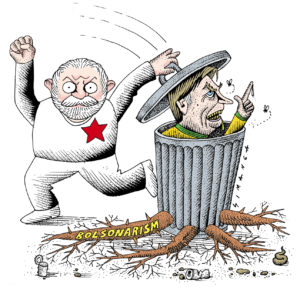
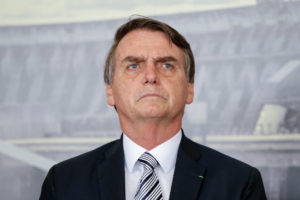
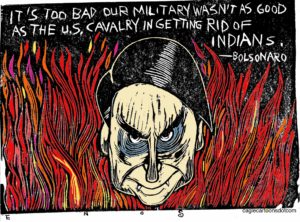
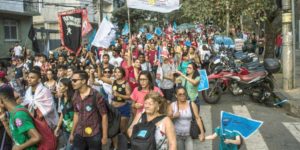
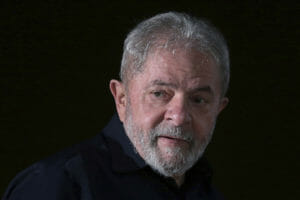


You need to be a supporter to comment.
There are currently no responses to this article.
Be the first to respond.